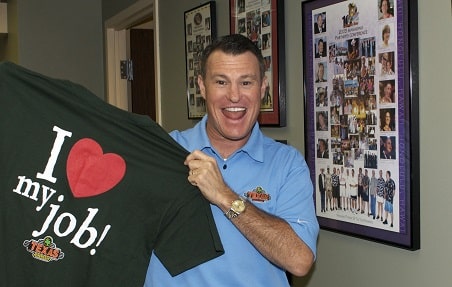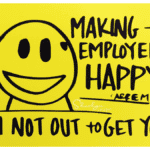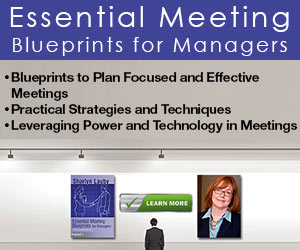As human resources professionals, we’ve seen plenty of articles about how we need to ditch the performance appraisal. Today, I want to share with you the story of a company that’s done just that.
Texas Roadhouse (aka Roadhouse) is a full-service, casual dining restaurant chain. They operate over 400 restaurants in 48 states and 3 countries. Their motto of “legendary food, legendary service” has led them to be recognized as one of the Employee’s Choice Best Places to Work by Glassdoor and one of America’s 100 Most Trustworthy Companies by Forbes Magazine.
Mark Simpson is vice president of Legendary People at Texas Roadhouse. I met Mark at Ultimate Software’s 100th HR Workshop celebration here in South Florida. During his presentation, he shared with the audience a video that Roadhouse, in partnership with Coca-Cola, showed their management team a few years ago. Even though the video was produced in 2009, there are some very interesting and alarming statistics.
These predictions about the future workforce made Roadhouse realize they needed to change the way they managed performance. Mark said the senior leadership team had been trying to figure out for some time how to separate the performance appraisal process from merit increases. “When performance and pay are tied together, it creates an emotional conversation. We wanted to change the performance discussion to become more productive and constructive.”
Interestingly, Mark said he found the answer in an unsolicited email with a subject line about killing the performance appraisal. The email shared details from the book, “Get Rid of the Performance Review!” by Samuel A. Culbert, professor of management at UCLA. After reading the book, Mark decided to share it around the office and see what others thought.
Texas Roadhouse is a bottom-up driven organization. Their corporate offices aren’t called that – they’re called the support center because they “support” operations. When decisions are made, the question is asked, “What do our operators think and how will it affect them?” because according to Mark, “they are the center of our universe. They are the reason we’re profitable and successful.”
After getting a positive reaction to the idea of “killing” performance appraisals, a management team was formed to build and implement the new system. Managers were chosen because they understand both sides of the performance appraisal process. They give reviews and they get reviewed. Mark said it was this team that sold the new process to the President. “It became a project driven by our people, not an HR initiative.”
The new performance appraisal process is called GPS (growth, plan, support) and takes place 30 days before or after an employee’s anniversary date. Its purpose is to be forward-looking instead of backward. Managers already had regularly scheduled one-on-one meetings. That’s the time to talk about current performance. The new GPS process focused on the future:
GROWTH: What career opportunities would you like in the future?
PLAN: How do you prepare for those future opportunities?
SUPPORT: What resources do you need to be successful?
Just in case you’re wondering, at Roadhouse, annual pay increases are based upon cost-of-living. Discretionary increases can happen at any time. Mark said that merit increases are based upon three factors: taking on additional responsibilities, exceptional performance, or promotions.
The performance appraisal has been entrenched in Corporate America for a very long time. I asked Mark to share how the change has impacted the organization. He said first and foremost it put career development in the hands of employees. “At Roadhouse, employees are in charge of the GPS conversation. They set up the meeting with their manager. They come prepared to talk. It’s a two-way discussion. Employees truly have a say in their professional careers.”
During our conversation, Mark also mentioned that the company has low turnover and high employee engagement. Texas Roundhouse out performs their competitive set in sales. While Roadhouse cannot make a direct link between these outcomes and changing the performance appraisal, it’s clear that giving employees control over the process and transforming the manager role into more of a career coach has brought benefits.
The Texas Roadhouse story should remind us that change – even big changes – can be successfully implemented. It takes getting buy-in, having a plan, and listening to feedback.









Daniel Hauenstein says
Sharlyn, I really appreciate your focus on this issue. I’m in the process of eliminating performance appraisals here and negotiated a change in our labor agreement to accommodate it. It is an idea whose time came a long time ago! The video is compelling.
Sharlyn Lauby says
Hi Dan! Thanks for sharing your experience. Hope to see you in Orlando next week.
Daniel Hauenstein says
Sharlyn, wish I could see you in Orlando but, alas, our budget is too tight to allow for the travel this year. We’ll cross paths again, I’m sure.
Katie says
Getting rid of the traditional performance review is definitely becoming top of mind. This article is a great example of how an organization can benefit from taking a new direction. We recently held a webinar on ditching the traditional performance review and had quite a bit of interest.
Dawana Talya says
Talks easy. My wife works at Texas Roadhouse & hasn’t had a raise or proformance or merit review in three yrs. This is all OR because they are going on Etrade
Whitney says
I have worked at 3 different Texas roadhouses and absolutely love working for the company. They make it very easy for hard workers to excel in their career. I know personally people who have moved up from being a buss boy or server to be coming a manager over time. I myself in the past year have been promoted several times. I think it’s great that the management skewed its employees to move up the chain. Dewanna, maybe your wife should sit down with her management and see if there is anything she can do to move up in the company. In the additional it states that the employee sets up the meeting with the manger, they come prepared with topics to talk about. Maybe she should sit down with them to figure what she needsto do to get to where she wants to be at Texas roadhouse.
Dawana Talya says
Don’t put it back on the employee to take the mgmt. role. If no review in 3yrs that’s in the file & top brass is either incompetent or doesn’t care
PM Hut (@pmhut) says
I am one of those who firmly believe that the performance review can be insulting and is often used to settle accounts.
It’s really weird that companies still opt for performance reviews as they are; the point of them is just telling the person how he sucked during the past year and what he can do to stay in the company (and maybe get a raise).
Ed Darrell says
Eliminating the annual performance review is right out of the Deming playbook, isn’t it?
It’s particularly painful for me to have switched from business to education, where there are organized efforts by state legislatures and “reform” groups to make teacher performance reviews sharply more brutal, and less tied to real education results.
Do you ever talk to groups of educators about this?
Tarik Taman says
Sharlyn, fascinating. I would question your final paragraph however. You say that the change requires “getting buy-in” it strikes me that this initiative was driven by the implementers and needed practically no buy-in. Maybe there is a lesson there for all centrally driven initiatives.
Sharlyn Lauby says
Hi Tarik. Thanks for the comment. To me, buy-in takes many forms and fashions. It can be as simple as sending a book to a colleague with a note – “I found this interesting. What do you think?” It can also be a large effort such as managers telling the CEO, “We want to try this.”
Sometimes, this can be time consuming or challenging. Other times it can be relatively easy, as in this case. But, the worst thing you can do is just assume everyone is on board. Regardless of who started the discussion, circulating the idea is buy-in.
In my experience, having the authority to make a decision and the responsibility for implementation does not absolve me of getting buy-in. The process of getting buy-in makes the decision better and implementation smoother.
Mark Simpson says
Thanks for all the comments about our GPS initiative. The GPS process was rolled out to our support center (corporate office)employees only.
Dawana Talya, I would welcome the opportunity to discuss your wife’s concerns. She can contact me at 1-800-TEX-ROAD.
Lajuana Cross says
Everyone has there on perspective on formal performance appraisal process. Taking a step back to look at the larger picture one could view performance appraisal as one of the components of solid performance management process. A visionary performance management process should include not only reviewing the past which can be done through regularly scheduled one-on-one meetings throughout the year culminating with an overview meeting of the previous year. Additionally what should be taking place is conversations with the employee for career aspirations where plans are developed between leader and the employee as well as monitored by the parties involved. And one other aspect would be to include focus on employee development if need be for current position. This does not mean a need for additional meetings between leaders and their staff. Effective conversations about performance should always include aspects of potential development opportunities for current position as well as future aspirations.
Alexis Kingsbury says
Love this article, thanks Sharlyn.
The focusing of the performance review meeting being forward-looking rather than backward looking is really positive.
It would be interesting to know whether in practice people really talked about previous history first, or whether they used it for context/baseline (akin to GROW) or whether they avoided that completely!
Mark Simpson says
The GPS discussion should be forward looking only Alexis. Performance issues should be addressed in real time via one on ones. Obviously some of the GPS discussion could be on how to improve in areas that need improvement but it should not be an evaluation of past performance. Hope that makes sense!